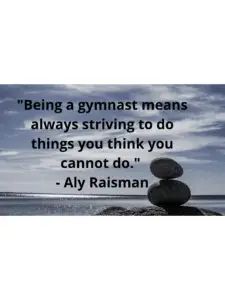“Being a gymnast means always striving to do things you think you cannot do.” -Aly Raisman
I recently read this quote and felt it was a great quote for gymnasts. In fact, it applies not only to gymnastics, but to other sports, and to life in general. “Always striving” made me think of grit, a quality that is essential in high level athletes, and is also a quality that teachers are working to foster in schools.
According to Merriam-Webster, the definition of grit is “firmness of mind or spirit: unyielding courage in the face of hardship or danger.” The Oxford dictionary defines it as “courage and resolve; strength of character.” Combining these definitions, someone who displays a lot of grit is someone who is courageous, with a strong mind, and maintains that strength and courage during hard times. I have always thought that someone who has a lot of grit is someone who has a lot of mental toughness, and who gets better and better as the circumstances get tougher.

Why is this important?
As I write this, we are in the middle of the COVID-19 pandemic. All gyms are closed, as are restaurants, bars, and non-essential businesses. The Olympics have been postponed. Many people have lost their jobs, and small businesses are unsure what their future holds. The most difficult part about this situation is the uncertainty of how long it will last. People are trying to make the best of it, but it can be a challenge.
For athletes, most are currently unable to train at their normal training facilities. There is no set date for them to return to training. Athletes are training at home, for the most part, and trying to do what they can without proper equipment, coaching, and teammates. There is no training plan, because they don’t know when their next game or competition will be. Many athletes are wondering if they can keep up their skills and physical fitness without being able to train in their normal facilities.
What’s an athlete to do when their path is uncertain? Focus on the things that you can control. You CAN still keep a regular training schedule, even if you can’t train with your coach and teammates. You CAN do body weight exercises, endurance training, and plyometrics with little to no equipment at home. You CAN work on flexibility, choreography, and the little details of a routine that might get ignored. You CAN do mental training to ensure your mindset is top notch once you get back into the gym. Also see 5 ways to have fun doing gymnastics at home.
What can a coach do when their contact with their athletes is limited? You CAN spend time writing lesson plans, training calendars, and conditioning programs. You CAN watch videos and search the internet for new ideas for your gymnasts for next year, or brush up on each level’s requirements (check out this Making Sense of Composition series!). You CAN make videos of training ideas your gymnasts can implement at home. (Make sure you follow the SafeSport guidelines!) You CAN stay connected with gym families through social media channels and YouTube videos. One coach I know made a video of himself waiting for the gymnasts to come back, looking longingly at the empty gym, pretending to spot, etc. It was great comic relief for our gymnastics community, and a reminder to his gym families that he missed them!
What can judges do when there aren’t meets to judge, and they can’t go into a gym? You CAN do video practice judging. You CAN clean out your judging bag and make sure you have the most current information in your folders. You CAN make sure your Code of Points is up to date, and study all those tough symbols!
Mental toughness is always important to an athlete, but it is even more essential during times of adversity. It takes a special kind of grit to keep practicing your sport even when your normal practices have been shut down. It takes a lot of dedication, hard work, and love for what you do.
The key is, no matter what your involvement in the sport, there are plenty of things you CAN do during this time to make yourself even better once the gyms are open again. Down time doesn’t have to be lost time. And one day, you will look back and marvel at the determination that kept you going during this seemingly endless time.